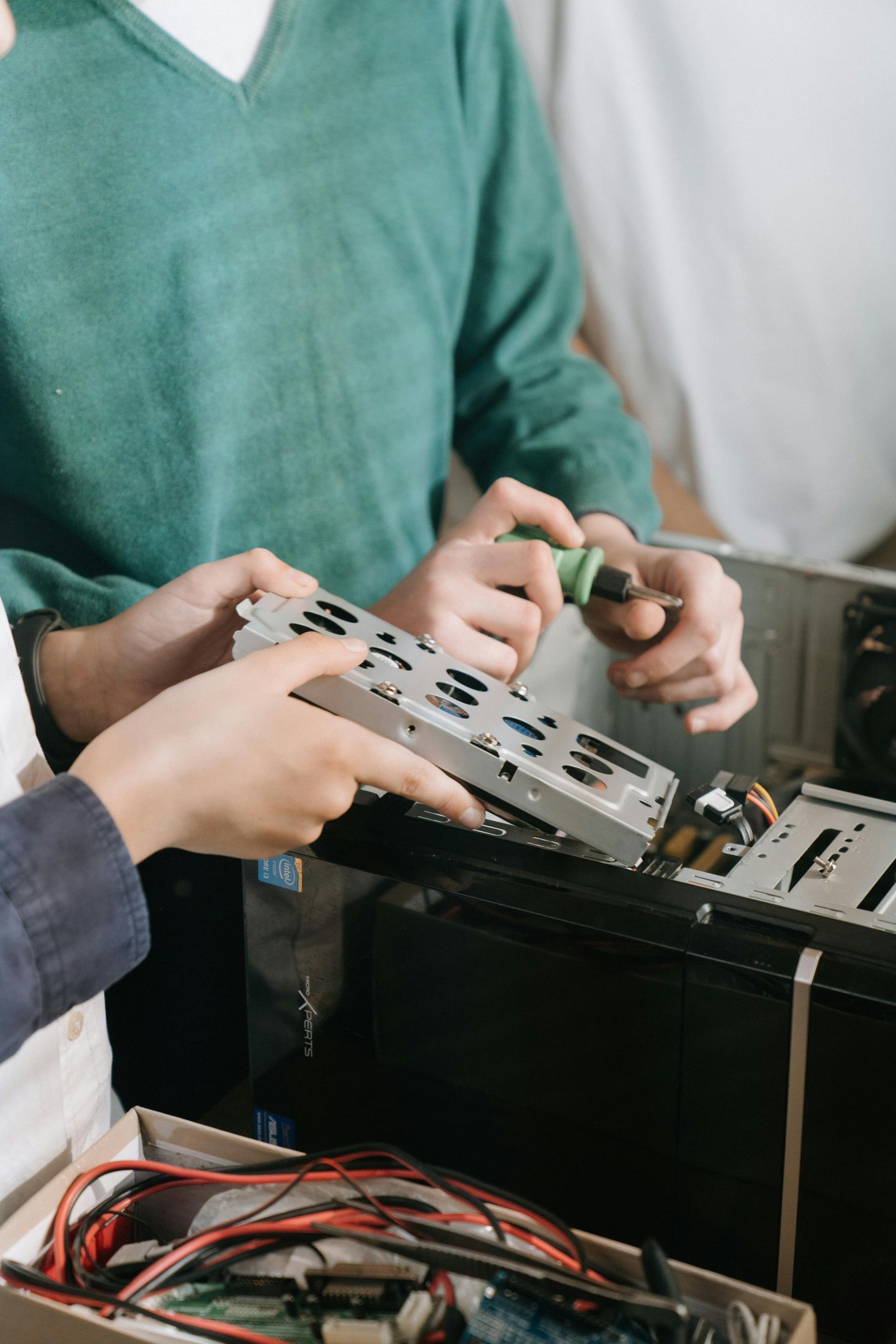ANXIOUS ABOUT AI TECHNOLOGY MAKING YOU REDUNDANT?
Strategies for Adapting to the Effects of AI on Employment

Jamieson Lee Hill, Monday 29th April, 2024
With the widespread use of AI across industries, there is growing anxiety among employees and freelancers about how their jobs and businesses could be affected. Let us explore the possible effects of AI and how we can adjust to this massive technological revolution!
The likely effect of AI on the Employment Market
Twelve months ago, Goldman Sachs warned that 300 million jobs could go or at least be reduced due to AI.
“Goldman Sachs reported this week in a sobering and alarming report about AI's ascendance. The investment bank estimates
300 million jobs could be lost or diminished by this fast-growing technology.”
Source:
Forbes, March 31, 2023
In contrast, the World Economic Forum’s outlook on AI upbeat, predicting that more jobs will be created than lost,
“Despite concerns about job displacement, studies suggest that AI has the potential to create more jobs than it replaces. The World Economic Forum predicts that while AI may replace around 85 million jobs by 2025, it will also create approximately 97 million new roles.”
Source: Ben Simon
It remains to be seen… However, there is certainly anxiety for many people about how AI could affect their livelihoods. Let’s now investigate the sectors will be affected most and least.
Understanding AI and its Impact on the Workforce
Forbes identified AI affecting 3 sectors with the greatest impact; they were Finance and banking, Media and Marketing, and Legal Services. Furthermore, Forbes predicted that the least impact would be experienced by agriculture, mining, and manufacturing. The high prevalence of digital technology in the first 3 industries was the reason. In contrast, agriculture and mining have many manual workers and manufacturing has been automated since the 1960s in any case.
The World Economic Forum produced an interesting report in 2020 ‘ The Future of Jobs Report 2020. It gives insights into the future impact of AI and digital technologies on the employment market.
Let’s now consider 4 strategies you can adopt to face the AI revolution:
1. Perspective: Facing the Technological Change
It is natural to feel threatened that your job may be at risk due to AI. Taking a historical perspective may help to reduce your anxiety about and appreciate that this isn’t the first time the world has faced great change…
…From 1811 to 1816, factory workers rose up against the use of machines and automation. The Luddite Movement started in Nottingham, England, and later spread to the North West of England including Yorkshire. However, factory owners and the military suppressed the uprising and many protesters were shot dead.
Back in the 19th century, those workers in England felt great apprehension about automation and how it could affect their way of earning money. However, that new technology eventually became normalised and a part of everyday life. It is most likely that it will be the same with AI advancements. History is all about change!
2. Mindset Shift
It is important not to become too anxious reading doom-mongering headlines and instead prepare ourselves. Adopting a positive mindset approach to AI is a pragmatic way to face the challenges. Rather than wallowing in fear with a fixed mindset about how the status quo should be, you can read books and articles about the concept of Growth Mindset. Self-development could help you unlock your own hidden potential to thrive in these changing times.
Highly recommended books are:
- Bounce by Matthew Syed
- Let it Go by David Rahman
- The Power of Action by Daniel Walter.
3. Identifying AI-Resistant Skills/Roles
Another strategy is to explore the jobs and skills that are less likely to be made redundant by AI. It is recommended you focus on jobs and businesses that require human creativity, emotional intelligence, and strategic thinking. Here is some suggested reading to start you off:
- Skills of the Future: 10 Skills You’ll Need to Thrive in 2020 looks into the skills that will be most valuable in the job market in 2025.
- This LinkedIn article by an HR Executive looks at the most and least affected jobs in the future.
- Finally, this eye-opening article by the US Career Institute examines 65 jobs least likely to be affected by AI.
4. Lifelong Learning: Staying Relevant in the Age of AI
Taking a lifelong learning approach to the AI transformation is a proactive step. Continuous learning and adapting your skillset will help you stay competitive in an evolving job/freelance market. There are many online courses available on platforms such as Coursera, Udemy, and Skillshare on AI. These can help develop new skills and perhaps even take a new work direction!
Exciting times or anxiety ahead? The choice is all yours!
To find out how IP House Colocation Data Services can help your company, fill out the contact form today!
Sources
- https://www.fastcompany.com/3058422/skills-of-the-future-10-skills-youll-need-to-thrive-in-2020-and-beyond
- https://www.linkedin.com/pulse/ai-revolution-jobs-most-least-affected-saikapil-gurram/
- https://www.uscareerinstitute.edu/blog/65-jobs-with-the-lowest-risk-of-automation-by-ai-and-robots
- https://www.udemy.com/course/generative-ai-for-beginners-b/?couponCode=KEEPLEARNING
- https://www.matthewsyed.co.uk/book/bounce-the-myth-of-talent-and-the-power-of-practice/
- https://www.david-rahman.com/
- https://www.amazon.co.uk/Power-Action-Do-Now/dp/B0CZHM8P58?source=ps-sl-shoppingads-lpcontext&ref_=fplfs&psc=1&smid=A3P5ROKL5A1OLE
- https://www.weforum.org/reports/the-future-of-jobs-report-2020
- https://www.linkedin.com/pulse/how-ai-create-more-jobs-than-takes-comprehensive-outlook-ben-simon/
- https://www.forbes.com/sites/jackkelly/2023/03/31/goldman-sachs-predicts-300-million-jobs-will-be-lost-or-degraded-by-artificial-intelligence/?sh=7de2385e782b
- https://www.key4biz.it/wp-content/uploads/2023/03/Global-Economics-Analyst_-The-Potentially-Large-Effects-of-Artificial-Intelligence-on-Economic-Growth-Briggs_Kodnani.pdf
Contact Us











